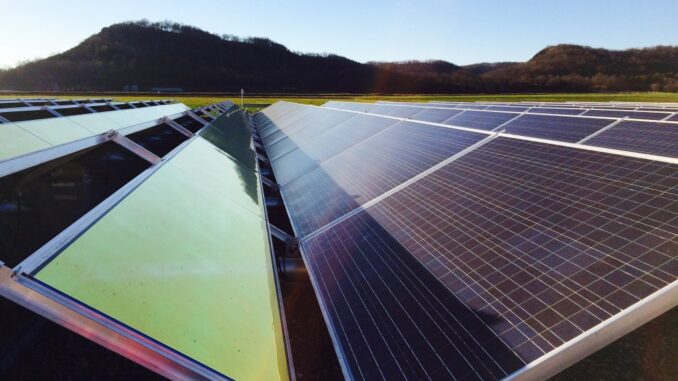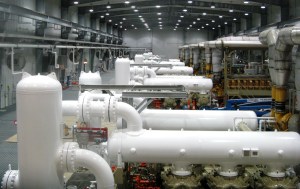
This article originally appeared on Planet Detroit.
Advocates across Michigan celebrated last week as Gov. Gretchen Whitmer signed into law a package of energy bills targeting 100% clean power by 2040, positioning Michigan as a national climate leader.
But environmental justice advocates say the legislation, dubbed the “Clean Energy Future” package by supporters, had a major omission by making no provision for community solar, which allows residents to subscribe to third-party-owned solar arrays in exchange for energy bill credits.
The Michigan Environmental Justice Coalition (MEJC) is pushing for the passage of Senate Bills 152 and 153 and House Bills 4464 and 4465, introduced in the spring, which would enable community solar in Michigan.
But so far, none of the bills have come up for a vote, although the House Committee on Energy, Communications and Technology heard testimony on the House bills in November.
“It’s no secret that we are not very happy with the Clean Energy Future package,” Roshan Krishnan, policy associate at MEJC, told Planet Detroit. Krishnan said enabling community solar would accelerate solar buildout in the state and reduce demand for carbon capture and biofuels — polluting technologies included in the bill package — which MEJC opposes.
Backers say community solar, more accessible to lower-income customers and those living in multifamily housing, is crucial to building equity into the energy transition. They tout other benefits like improved energy reliability and lower bills for renters and others who can’t install rooftop solar.
But they say Michigan utilities are wielding their influence and political spending in Lansing to block legislation enabling community solar owned by third parties, even though the concept enjoys bipartisan support.
Michigan’s two largest investor-owned utilities, DTE Energy and Consumers Energy, have long fought laws enabling community solar. They argue such laws are unnecessary and would add costs for other customers. And they’ve spent millions in the last two years to influence lawmakers as such laws were being considered.
According to the U.S. Department of Energy, 22 states and the District of Columbia have policies in place that enable community solar. Most projects are concentrated in four states: Minnesota, New York, Massachusetts and Florida.
Ed Rivet, executive director of the nonprofit Michigan Conservative Energy Forum, told Planet Detroit he believes the public’s increasing embrace of renewable energy could give groups like his leverage to pressure lawmakers to bring community solar to Michigan.
“Part of our work … is to say to legislators, ‘Look, people want to do this in your district. Republicans and Democrats alike want to do this. Go ahead and ask folks in your district and see what you find’,” Rivet said.
Rivet said utilities’ influence in Lansing is the major hurdle to passing community solar legislation.
“If there’s resistance to the legislation being adopted, it’s coming from a singular vantage point, that being the utilities,” he said.
DTE and Consumers are unequivocal in their opposition to community solar. DTE spokesperson Peter Ternes told Planet Detroit the proposed community solar legislation is “unnecessary” and would “allow developers to cherry-pick customers and force the utility’s remaining customers to subsidize the program – challenging affordability for our customers.”
Consumers spokesperson Brian Wheeler also called the legislation “unnecessary,” warning that it would allow “unregulated, out-of-state solar developers” to have “unfiltered access to the grid while pushing for a premium price for their own solar projects at the expense of low-income customers.”
Ternes and Wheeler each endorsed their respective companies’ utility-owned programs, DTE’s MIGreenPower and Consumers’ Solar Gardens, where residents voluntarily charge extra bills to support utility-owned solar developments.
Rivet criticized these programs, noting they are designed so customers pay more for clean energy without receiving a financial benefit for investing in a power source that is cleaner and often cheaper than others.
There’s little doubt utilities are spending resources to influence legislators. Utility watchdog group Energy and Policy Institute revealed that political action committees (PACs) tied to DTE and Consumers gave nearly $500,000 to campaign accounts for Whitmer, state legislators and state party funds in 2023 while renewable energy legislation was being considered, with 80% of legislators taking money from these PACs.
The analysis showed that key Democratic lawmakers received far more than other party members this year. For example, House Speaker Joe Tate (D-Detroit) took $30,000 from utilities, and Senate Majority Leader Winnie Brinks (D-Grand Rapids) received $15,500.
In 2022, DTE-affiliated dark money groups gave $2 million to Democratic groups.
A 2021 study from Michigan State University found that enabling community solar would create thousands of jobs over the next 25 years and bring $1.5 billion in economic benefits.
And advocates say it would better position the state to compete for grants through the $7 billion federal Greenhouse Gas Reduction Fund for projects that reduce or avoid planet-warming emissions, emphasizing low-income and disadvantaged communities.
But they say the greatest potential benefits lie in creating opportunities for low-income residents to lower their energy bills and access more reliable power. Residential customers in Michigan pay the highest rates in the Midwest, and DTE and Consumers are some of the worst utilities in the nation for the duration of blackouts. On Dec. 1, the Michigan Public Service Commission approved a $368 million rate increase for DTE that would add $6.51 to the average customer’s monthly bill.
HB 4464 would require 30% of each community solar project to go to low-income households or service organizations.
In comments to the Michigan House Energy, Communications, and Technology Committee in November, Dr. Elizabeth Del Buono, president of Michigan Clinicians for Climate Action, said community solar would also be a win for public health.
Del Buono said community solar will make the grid more reliable during power outages when paired with battery storage, “thereby protecting the health of vulnerable patients dependent on electricity to breathe and be mobile.”
According to John Richter, senior policy analyst at the nonprofit Great Lakes Renewable Energy Association, additional legislation would be in order if community solar did pass.
That would include raising the state’s “solar cap,” which sets the percentage of peak yearly load that a utility must buy from distributed energy producers.
The Clean Energy Future package raised this number from 1% to 10%, but State Sen. Jeff Irwin (D-Ann Arbor) introduced Senate Bill 362 this year to remove the cap. Irwin’s bill would also restore “net metering,” where rooftop solar customers are credited for energy put back on the grid at the same retail rate they pay for electricity.
Following intense utility lobbying, net metering was replaced by an “inflow-outflow” tariff in 2018, which deducts transmission costs from credits. That change increased the time to recoup up-front costs for the average rooftop solar producer from roughly nine years to 13 years.
Richter said that if these credits aren’t increased, “it would basically be pointless” to try to make community solar projects work economically for residents and developers.
But with Democrats losing their majority in the Michigan House in 2024, community solar may be one of the few energy priorities that could move forward, according to Rivet.
“Because it does have bipartisan support, it at least has a chance of being the next round of dialogue on energy policy,” he said.
Krishnan is less optimistic.
“Nothing is going to move unless the leadership actually steps up to the plate and does it,” he said. “And they’ve shown absolutely no inclination that they are willing to do so, which I think is frankly reflective of their extreme lack of commitment to environmental justice.”



